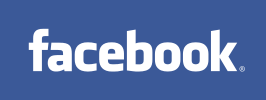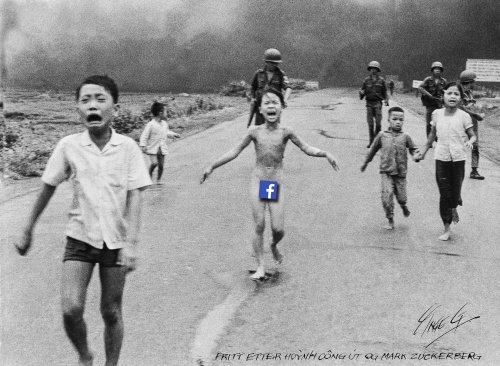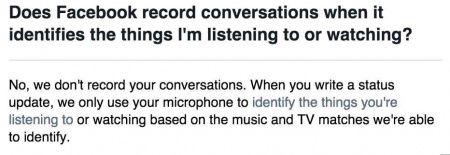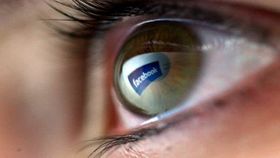Difference between revisions of "Facebook"
m (Text replacement - "|twitter=" to "|twitter=https://twitter.com/") |
|||
| Line 1: | Line 1: | ||
{{website | {{website | ||
|URL=https://Facebook.com | |URL=https://Facebook.com | ||
| − | |twitter=Facebook | + | |twitter=https://twitter.com/Facebook |
|wikipedia=https://en.wikipedia.org/wiki/Facebook | |wikipedia=https://en.wikipedia.org/wiki/Facebook | ||
|image=Facebook.svg | |image=Facebook.svg | ||
Revision as of 12:44, 24 February 2018
| The world's most popular social network, with over 1,000,000,000 users in 2014. |
Started: February 4, 2004
Founders: Mark Zuckerberg, Eduardo Saverin, Andrew McCollum, Dustin Moskovitz, Chris Hughes
Subgroups: Instagram, WhatsApp, Oculus VR, PrivateCore
Owner: Mark Zuckerberg
Staff: 10082
Contents
Sub-Pages
| Page Name | Size | Description |
|---|---|---|
| Facebook/Censorship | 7,102 | Facebook has censored its users' free speech for years. After being quasi-covert, this became explicit in 2020 as part of the COVID-19/Censorship. |
| Facebook/Oversight board | 1,240 | The group charged with deciding what could be said on Facebook, and what should be removed |
As the world's most widely used social website, Facebook has a great - and often poorly understood - ability to influence its users.[1]
Control
The first board member was Bilderberg/Steering committee member, Peter Thiel.[2]
Gatekeeping
WhoWhatWhy reports that gatekeeping is a common phenomenon in Facebook, as editors reported regular manual intervention to add or remove particular news stories from the 'trending' news feed.[3]
Censorship
- Full article: Facebook/Censorship
- Full article: Facebook/Censorship
Facebook reported a 21% rise in takedown requests in the latter half of 2017, up from 64,279 to 78,890. The US accounts for 57% of all requests.[4]
"Fake News"
Mark Zuckerberg wrote in 2017 that "Right now, we're starting to explore ways to use AI to tell the difference between news stories about "terrorism" and actual terrorist propaganda so we can quickly remove anyone trying to use our services to recruit for a terrorist organization."[5]
"Have Speech"
On May 31, 2016, Facebook agreed with Google, Microsoft, and Twitter to a European Union code of conduct obligating them to review "[the] majority of valid notifications for removal of illegal hate speech" posted on their services within 24 hours.[6]
Mass surveillance
With over 1,000,000,000 active users, Facebook is recording a lot of data about a lot of people. Together with other social media, in 2016, Facebook "accounted for 43 percent of all traffic to major news sites. Nearly two-thirds of Facebook and Twitter users access their news through their feeds."[7]
Content moderation
A 2015 estimate put 1/3 of Facebook's entire staff as moderators, but Facebook claimed this was an overestimate - although without offering an alternative figure.[8]
The editor of Norway's largest newspaper found his Facebook feed censored after he posted the 1972 image of Kim Phúc running away from a US napalm attack. In an open letter to Mark Zuckerberg he complained that "First you create rules that don’t distinguish between child pornography and famous war photographs. Then you practice these rules without allowing space for good judgement. Finally you even censor criticism against and a discussion about the decision – and you punish the person who dares to voice criticism."[9]
Tracking of Users
Facebook admits to using the microphone to listen to users' environments, but has claimed that it does not record conversations.
Since 2012, Facebook has been "better understanding of our ecosystem" by encouraging users to report if their friends use the network under an assumed name.[2] Mark Zuckerberg has been consistent in his explanation of the plan to shareholders, a plan to be the middle-man in all personal communication.[10]
Tracking of Non-users
In April 2015, after research bu Belgian privacy regulators, Facebook admitted that it was placing a cookie on "some" people's browsers, even if they were not Facebook users and had never visited the site. It claimed that this was due to a "bug".[11]
Advertising
Since 2012, Facebook has been buying sensitive data about users’ offline lives from data brokers and combining this information with the online data it collects in order to sell this information to advertisers.[12]
Research
Facebook is used as a research tool by ordinary users, but the company itself also carries out undisclosed research on users. An internal document leaked in 2017 showed how by monitoring posts, comments and interactions on the site, Facebook can figure out when people as young as 14 feel “defeated”, “overwhelmed”, “stressed”, “anxious”, “nervous”, “stupid”, “silly”, “useless”, and a “failure”.[13]
Emotional Contagion
Multiple experimenters have used data from Facebook to study 'emotional contagion', how mood is transferred between friends. It was announced in 2014 that some research was not merely observational, but involved investigations in manipulating users' moods through the skewing of data presented through Facebook. For 7 days, 689,003 users were presented with modified newsfeeds which included more or less "happy" or "sad" phrases from friends. The study concluded "that emotional states can be transferred to others via emotional contagion, leading people to experience the same emotions without their awareness."[14]
Face recognition
Facebook announced in 2014 that it has developed a program called "DeepFace," which can determine whether two photographed faces are of the same person with 97.25% accuracy - compared with a human ability of discriminating faces at about 97.5%.[15]
Experiments by users
In 2014, Matt Honan, a journalist for Wired magazine notes the effects of an experiment he tried out - "liking" everything which Facebook served up to him for 48 hours.[16]
Lawsuits
Since 2011, Max Schrems, an Austrian lawyer has repeatedly requested all information Facebook hold on him.[17] arguing that under European law he was entitled to this. Multiple legal resubmissions later, on 2 December 2015, Schrems resubmitted his original complaint against Facebook with the Irish Data Protection Commissioner. He has set up a website at http://europe-v-facebook.org to promote his viewpoint.[18]
Facebook on Wikispooks
References
- ↑ https://medium.com/@tristanharris/how-technology-hijacks-peoples-minds-from-a-magician-and-google-s-design-ethicist-56d62ef5edf3#.b4f6nhqo2
- ↑ a b http://www.digitaltrends.com/social-media/facebook-snitch-on-friends-that-arent-using-real-names/
- ↑ http://whowhatwhy.org/2016/05/10/internet-gatekeeper-evidence/
- ↑ http://www.theregister.co.uk/2017/12/19/facebook_who_needs_millennials_the_cops_love_us_more_than_ever/
- ↑ https://www.theregister.co.uk/2017/02/17/zuckerberg_publishes_worldsaving_manifesto/?page=2
- ↑ "Facebook, YouTube, Twitter and Microsoft sign EU hate speech code". The Guardian. Retrieved 7 June 2016.Page Module:Citation/CS1/styles.css must have content model "Sanitized CSS" for TemplateStyles (current model is "Scribunto").
- ↑ http://www.theverge.com/2016/4/13/11387934/internet-moderator-history-youtube-facebook-reddit-censorship-free-speech
- ↑ http://www.theverge.com/2016/4/13/11387934/internet-moderator-history-youtube-facebook-reddit-censorship-free-speech
- ↑ http://www.aftenposten.no/meninger/kommentar/Dear-Mark-I-am-writing-this-to-inform-you-that-I-shall-not-comply-with-your-requirement-to-remove-this-picture-604156b.html
- ↑ http://saintsal.com/facebook/
- ↑ http://thehill.com/policy/technology/238399-facebook-claims-a-bug-made-it-track-people-not-on-facebook
- ↑ http://projectcensored.org/23-facebook-buys-sensitive-user-data-offer-marketers-targeted-advertising/
- ↑ http://www.news.com.au/technology/online/social/leaked-document-reveals-facebook-conducted-research-to-target-emotionally-vulnerable-and-insecure-youth/news-story/d256f850be6b1c8a21aec6e32dae16fd
- ↑ http://www.theatlantic.com/technology/archive/2014/06/everything-we-know-about-facebooks-secret-mood-manipulation-experiment/373648/
- ↑ http://www.huffingtonpost.com/2014/03/18/facebook-deepface-facial-recognition_n_4985925.html
- ↑ http://www.wired.com/2014/08/i-liked-everything-i-saw-on-facebook-for-two-days-heres-what-it-did-to-me/
- ↑ https://www.forbes.com/sites/kashmirhill/2012/02/07/the-austrian-thorn-in-facebooks-side/
- ↑ http://europe-v-facebook.org



